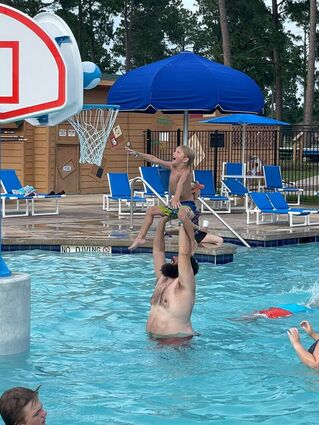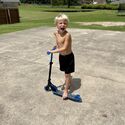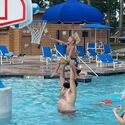Normalcy for children in foster care helps heal trauma
Last updated 7/13/2021 at 10:47pm

Elijah Ray George is a foster home success story. He lived with foster parents Alayna and Kenneth George and their two natural born children for two years before being adopted by the family. The Georges made "normalcy" a priority for Eli. Courtesy Photo
Swimming, attending camp, and participating in sports are something that many youngsters in the foster system miss. Many do not get the chance to experience these sorts of summertime activities.
Being removed from their home and placed in the child welfare system because their family is in crisis, these children are already facing trauma that no child should experience – yet on top of all of that, their participation in normal childhood activities with their peers often becomes an afterthought.
"Kids in foster care can feel disconnected from other kids their age because of what they're going through, so it's important to help them experience as much normalcy as possible," said Codie Vasquez, Executive Director of CASA of the Sabine Neches Region. "Getting the chance to participate in normal childhood activities – and just be a kid – can be essential to a child's well-being."
Alayna George has been a foster mother several times over the last four years. She and her husband, Kenneth, adopted their son, Elijah, after he was in their home for almost two years as a foster child. She can attest to the importance of creating normalcy in these children's lives.
"It can be really, really fun...we have the opportunity to present the world to them because most of the time, the kid has not had any type of extracurricular activities in their life so far. You get the opportunity to introduce them to a brand-new world," said George. "For Elijah specifically, he had never been to the lake, he had never gone on vacations. We've gotten to introduce him to fun things for a 5-year-old that he would never have had. It's fun to watch his face light up and get so excited over the simplest things, even just swimming in the pond or playing outside with a brand-new scooter or teaching him how to ride a bike without training wheels."
"The flip side to that is there are some restrictions, because if you want to take them out of the state, you have to get prior approval by the judge. That could take some time, so you do have to have organization in your planning and plan ahead," said George. She continued, "The parents do have a say if they don't want their kid to participate in certain things. You do have to follow what they prefer."
"Friendship and socialization are imperative for children to maintain good health and psychological well-being. While things like visitation, appointments and therapy are essential for the children we serve, we don't want them to come in the way of everyday activities that are also important to their development, such as school or extracurricular activities," said Vasquez.
"These children have been through enough. The last thing they need is to be excluded from fun social activities with their peers," said Vasquez. "This summer, CASA of the Sabine Neches Region aims to help local children in foster care have the opportunity to partake in normal, age-appropriate experiences."
CASA volunteers are specially trained and appointed by judges to speak up for a child and advocate for their unique needs in court, at school and in other settings. They also get to know the other adults in the child's life, including their parents, family, foster parents, caseworkers, counselors and more, and work with them to ensure the best interests of the child come first.
Ultimately, true normalcy is achieved when children are no longer in the system and have the resources and support, they need to thrive-preferably back home with their family whenever safe and possible. Until then, they need a voice to speak up for them, to ensure they can participate in hobbies and activities that will help them grow and heal.
CASA of the Sabine Neches Region is always seeking volunteers. Those interested can attend CASA's next virtual training session starting August 10. You can find more information at casasnr.org or call 409-886-2272.
George would "absolutely" recommend anyone contemplating foster parenthood to do it. "All these kids want is unconditional love."
"I would definitely say it is not easy," said George. "I'm not one to give false information saying it's all peaches and rainbows, it's not. But, in the end, when you see how far Elijah has come, any kid in a foster home...you can see the physical changes in their body and their smile. You see how good they feel and how happy they are.
"My Mimi has always said, 'A singing kid is a happy kid.' Elijah whistles and sings all the time. When you see the complete transformation in the kid and in your home you can't but know and feel and be certain that all the hardship is totally worth it. You are truly making a difference in the child."

Playing pool basketball with "Dad" is one type of normalcy that really helps build bounds for foster kids. Eli is pictured with his once foster, now adoptive dad, Kenneth George. Courtesy Photo.
For more information on becoming a foster/adoptive parent: https://www.dfps.state.tx.us/Adoption_and_Foster_Care/Get_Started/steps.asp










Reader Comments(0)